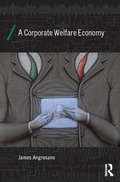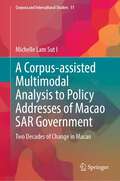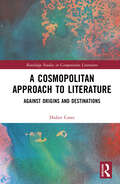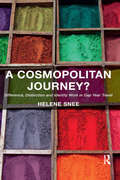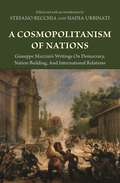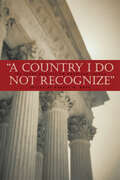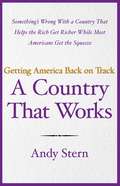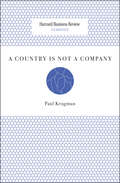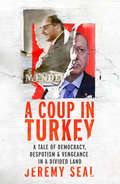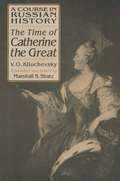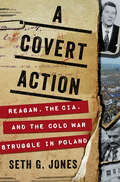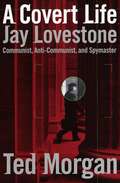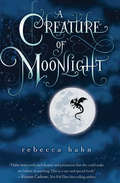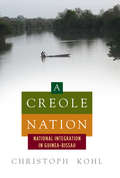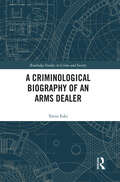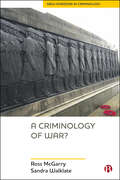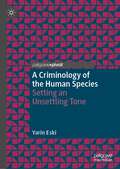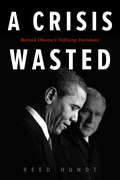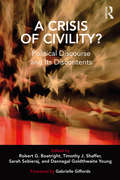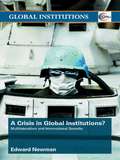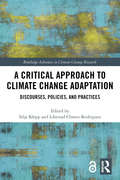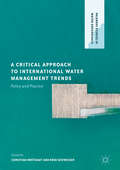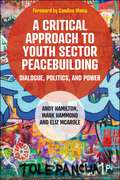- Table View
- List View
A Corporate Welfare Economy (Economics as Social Theory)
by James AngresanoAlthough political rhetoric and public perception continue to assume that the United States is the very definition of a free market economy, a different system entirely has in actuality come to prominence over the past half century. This Corporate Welfare Economy (CWE) has come about as government come increasingly under the influence of corporate interests and lobbyists, with supposedly equalising factors such as regulation skewed in order to suit the interests of the privileged while an overwhelming majority of US citizens have experienced a decline in their standard of living. James Angresano examines the characteristics of this mode of capitalism, both from the theoretical point of view but also with key reference to the different sectors of the economy – trade, manufacturing, industry and defense among them.
A Corpus-assisted Multimodal Analysis to Policy Addresses of Macao SAR Government: Two Decades of Change in Macao (Corpora and Intercultural Studies #11)
by Michelle Lam Sut IThis book introduces an integrated framework with corpus-assisted approach to deal with large set of data of discourse with multimodal factors to investigate how policy addresses (the government reports of Macao SAR) as a discourse type function in the social changes of Macao SAR through discussing the social factors to the production and consumption of policy addresses. The book explores research models or methodology in dealing with the contemporary topics in translation studies with a detailed presentation of the application of an analytical framework which marries corpus-assisted analysis, discourse analysis from socio-cultural perspective and multimodality with translation studies. Withal, the book is with the chapters to review the development of the social approach to discourse analysis and to introduce the stories of Macao with the summary of the development of this special region, in academic field, political and cultural fields.
A Cosmopolitan Approach to Literature: Against Origins and Destinations (Routledge Studies in Comparative Literature)
by Didier CosteThis cross-disciplinary approach to literary reading of any provenance based on an “experimental cosmopolitan” epistemology de- and recontextualizes the texts from the points of view of multiple cultures and historical moments, enriching interpretation and aesthetic experience beyond the backgrounds of the present reader and the origin of a particular literary discourse. Trusting the authority of an author or an “original” text and ignoring the fundamental plurilingualism of the literary experience obstructs the wealth of cosmopolitan reading in a globalized and fragmented world. A thorough critique of both local and overarching theories in clear dissent from the binaries of “decolonial theory” and the overextension of “nomadic theory” supports a precise research and teaching methodology at variance with past trends of Comparative and World Literature. Considering literature as the aestheticized use of language, which is universal, the many analyses provided can be extrapolated to other genres, eras, and cultural areas.
A Cosmopolitan Journey?: Difference, Distinction and Identity Work in Gap Year Travel
by Helene SneeDoes travel broaden the mind? This book explores this question through an innovative sociological study of gap year travel. Taking a year out overseas between school and university is an increasingly legitimate practice for young people in the UK. But what do young people get out of gap years? A wide range of 'official' sources acknowledge gap years as a way of becoming a global citizen and more employable at the same time. Instead of automatically assuming that gap years are a 'good thing', this book critically considers how this contemporary rite of passage could contribute to the reproduction of structural disadvantage at both a national and international level in relation to young people's routes into education and employment, and representations of difference and distinction in cultural practices. The key argument running throughout the book is that well-established ways of thinking about and understanding the world are used to frame gap year experiences, including how other people and places are different; the influence of class in determining what has cultural value; and what sort of identity work is worthwhile. Gap years are located at a point where a number of fields overlap: education, employment and the consumption of leisure travel. A Cosmopolitan Journey? will therefore be of interest to students, academics and practitioners in these areas.
A Cosmopolitanism of Nations: Giuseppe Mazzini's Writings on Democracy, Nation Building, and International Relations
by Giuseppe MazziniThis anthology gathers Giuseppe Mazzini's most important essays on democracy, nation building, and international relations, including some that have never before been translated into English. These neglected writings remind us why Mazzini was one of the most influential political thinkers of the nineteenth century--and why there is still great benefit to be derived from a careful analysis of what he had to say. Mazzini (1805-1872) is best known today as the inspirational leader of the Italian Risorgimento. But, as this book demonstrates, he also made a vital contribution to the development of modern democratic and liberal internationalist thought. In fact, Stefano Recchia and Nadia Urbinati make the case that Mazzini ought to be recognized as the founding figure of what has come to be known as liberal Wilsonianism. The writings collected here show how Mazzini developed a sophisticated theory of democratic nation building--one that illustrates why democracy cannot be successfully imposed through military intervention from the outside. He also speculated, much more explicitly than Immanuel Kant, about how popular participation and self-rule within independent nation-states might result in lasting peace among democracies. In short, Mazzini believed that universal aspirations toward human freedom, equality, and international peace could best be realized through independent nation-states with homegrown democratic institutions. He thus envisioned what one might today call a genuine cosmopolitanism of nations.
A Country I Do Not Recognize: The Legal Assault on American Values
by Robert H. BorkDuring the past forty years, activists have repeatedly used the court system to accomplish substantive policy results that could not otherwise be obtained through the ordinary political processes of government, both in the United States and abroad. In five insightful essays, the contributors to this volume show how these legal decisions have undermined America's sovereignty and values. They reveal how international law challenges American beliefs and interests and exposes U.S. citizens to legal and economic risks, how the "right to privacy" poses a serious threat to constitutional self-government, how the Supreme Court's religion decisions have done serious damage to our religious freedom, and more.
A Country That Works
by Andy SternAndy Stern, one of the most visionary leaders in America today, has fought relentlessly to ensure that Americans' hard work is rewarded in today's hypercompetitive, globalized world. As the newsmaking president of the fastest-growing, most dynamic union in America, he has led the charge for modernizing the "house of labor" -- taking unions out of the past and into the twenty-first century. He has spearheaded the campaign against the "Wal-Marting" of jobs and has innovated transformative solutions to the daunting problems facing Americans, from job insecurity to runaway health care costs. In this powerful critique and call-to-arms, he offers a revelatory dissection of the gathering threats to our standard of living -- threats that our politicians have failed utterly to address -- and he puts forth a bold, unassailable plan for making vital reforms. In his eye-opening diagnosis that makes the urgency of the threats vividly clear, Stern shows that Americans are contending with the most disruptive economic upheaval in the world economy since the Industrial Revolution. Yet, in the face of this daunting challenge, the American system simply isn't working well enough for most of us. Stern powerfully portrays how with the pace of globalization relentlessly quickening, the competitive pressures on our jobs and quality of life are heating up even more, especially as housing, health care, and oil prices skyrocket. While CEO salaries soar and business and the wealthy are handed plentiful tax shelters, the incomes of both white-collar and blue-collar workers stagnate, leaving most Americans struggling to pay off ever-escalating debt, instead of saving for retirement. The plain fact is that our system is out of whack, serving the interests of the top sliver of the most wealthy while putting the squeeze on the rest of us. Meanwhile, our politicians irresponsibly sidestep the crucial solutions that we so desperately need in order to make sure Americans can move into the twenty-first century with their futures secure. As Stern so persuasively shows, it is time for bold thinking and creative solutions to overhaul a health care system in crisis; correct a tax system rigged in favor of business and the wealthy; revamp our inadequate retirement system; and make truly innovative improvements in education. He presents a set of course-correction reforms so compelling, simple, and achievable that readers will find themselves enraged that they haven't yet been enacted. Americans have a right to expect our government to work for us. Andy Stern shows how we can get things back on track to make sure it does.
A Country is Not a Company (Harvard Business Review Classics)
by Paul KrugmanNobel-Prize-winning economist Paul Krugman argues that business leaders need to understand the differences between economic policy on the national and international scale and business strategy on the organizational scale. Economists deal with the closed system of a national economy, whereas executives live in the open-system world of business. Moreover, economists know that an economy must be run on the basis of general principles, but businesspeople are forever in search of the particularbrilliant strategy. Krugman's article serves to elucidate the world of economics for businesspeople who are so close to it and yet are continually frustrated by what they see. Since 1922,Harvard Business Review has been a leading source of breakthrough management ideas-many of which still speak to and influence us today. The Harvard Business Review Classics series now offers readers the opportunity to make these seminal pieces a part of your permanent management library. Each highly readable volume contains a groundbreaking idea that continues to shape best practices and inspire countless managers around the world-and will have a direct impact on you today and for years to come.
A Coup in Turkey: A Tale of Democracy, Despotism and Vengeance in a Divided Land
by Jeremy SealThe most dramatic, revealing and little-known story in Turkey's history - which illuminates the nation'Through the spellbinding career of a single, ill-fated leader, Jeremy Seal illuminates a bitterly divided country' Colin Thubron'Read this book if you're interested in Turkey. Read it if you're interested in power, hubris and redemption. Read it' Christopher de Bellaigue, author of The Islamic EnlightenmentIn the spring of 2016 travel writer Jeremy Seal went to Turkey to investigate perhaps the most dramatic, revealing and little-known episode in the country's history - the 'original' coup of 1960, which deposed the traditionalist Prime Minister Adnan Menderes. The story of Menderes - to his adoring supporters the country's founding democrat; to his sworn enemies its most infamous traitor - goes to the heart of the feud that continues to rage between the Western and secular ambitions of a minority elite and the religious and conservative instincts of the small-town majority. A Coup in Turkey is a thrilling account of the events leading up to the coup and the trials and executions that followed, a story of political subterfuge and score-settling, courtroom drama, state execution, authoritarian intolerance and ideological division. Seal travels through President Erdogan's Turkey, tracking down eye-witness accounts from survivors of the Menderes era in Istanbul, the historic metropolis, and the new capital at Ankara. As he expertly guides us through this extraordinary story, so the compelling parallels between past and present become strikingly clear, and he illuminates this troubled nation with a deep sympathy and love for the people and places he writes about. By focussing on one key event - one which many Turks regard with shame - this evocative, gripping portrait of Turkey recentres our understanding of the past and makes sense of one of Europe's most bewildering yet intriguing neighbours.'A wonderful writer' Robert Macfarlane
A Course in Public Economics
by John LeachA Course in Public Economics, first published in 2004, explores the central questions of whether or not markets work, and if not, what is to be done about it. The first part of the textbook, designed for upper-level undergraduates and first-year graduate students, begins with an extended discussion of the two theorems of welfare economics. These theorems show that competitive markets can give rise to socially desirable outcomes, and describe the conditions under which they do so. The second part of the book discusses the kinds of market failure - externalities, public goods, imperfect competition and asymmetric information - that arise when these conditions are not met. The role of the government in resolving market failures is examined. The limits of government action, especially those arising from asymmetric information, are also investigated. A knowledge of intermediate microeconomics and basic calculus is assumed.
A Course in Russian History: The Time Of Catherine The Great
by Marshall S. Shatz Vasili O. KliuchevskyIn this newly-translated excerpt from his five-volume "Course", Kliuchevsky (1841-1911) provides a colourful description of Russian court life in the 18th century, a dramatic narrative of the coup d'etat that brought Catherine II to power, a portrait of the empress herself, and an analysis of her foreign conquests and her major internal initiatives. While Kliuchevsky is critical of Catherine, he draws upon her memoirs and other writings and the accounts of her contemporaries to achieve a well-rounded and deeply human analysis of her character and personality. It is an extraordinary act of historical re-creation of the sort that brought Kliuchevsky such renown in his own time, and it remains so lifelike that it fairly leaps off the page. Kliuchevsky's examination of Western influence in Catherine's reign leads him to questions that were of urgent significance for Russia's development in his own day, and have remained so ever since: how to use Western ideas and practices to improve and enrich Russian life, without turning them into idle fashions or political bludgeons, and where to find the social leadership capable of performing such a delicate task.
A Covert Action: Reagan, The Cia, And The Cold War Struggle In Poland
by Seth G. JonesThe dramatic, untold story of one of the CIA’s most successful Cold War intelligence operations. December, 1981—the CIA receives word that the Polish government has cut telephone communications with the West and closed the Polish border. The agency’s leaders quickly inform President Ronald Reagan, who is enjoying a serene weekend at Camp David. Within hours, Prime Minister Wojciech Jaruzelski has appeared on Polish national television to announce the establishment of martial law. A new era in Cold War politics has begun: Washington and Moscow are on a collision course. In this gripping narrative history, Seth G. Jones reveals the little-known story of the CIA’s subsequent operations in Poland, which produced a landmark victory for democracy during the Cold War. While the Soviet-backed Polish government worked to crush a budding liberal opposition movement, the CIA began a sophisticated intelligence campaign, code-named QRHELPFUL, that supported dissident groups. The most powerful of these groups was Solidarity, a trade union that swelled to a membership of ten million and became one of the first legitimate anti-Communist opposition movements in Eastern Europe. With President Reagan’s support, the CIA provided money that helped Solidarity print newspapers, broadcast radio programs, and conduct a wide-ranging information warfare campaign against the Soviet-backed government. QRHELPFUL proved vital in establishing a free and democratic Poland. Long overlooked by CIA historians and Reagan biographers, the story of QRHELPFUL features an extraordinary cast of characters—including spymaster Bill Casey, CIA officer Richard Malzahn, Polish-speaking CIA case officer Celia Larkin, Solidarity leader Lech Walesa, and Pope John Paul II. Based on in-depth interviews and recently declassified evidence, A Covert Action celebrates a decisive victory over tyranny for U.S. intelligence behind the Iron Curtain, one that prefigured the Soviet collapse.
A Covert Life: Jay Lovestone: Communist, Anti-Communist, and Spymaster
by Ted MorganThe extraordinary life of Jay Lovestone is one of the great untold stories of the twentieth century. A Lithuanian immigrant who came to the United States in 1897, Lovestone rose to leadership in the Communist Party of America, only to fall out with Moscow and join the anti-Communist establishment after the Second World War. He became one of the leading strategists of the Cold War, and was once described as "one of the five most important men in the hidden power structure of America." Lovestone was obsessively secretive, and it is only with the opening of his papers at the Hoover Institution, the freeing of access to Comintern files in Moscow, and the release of his 5,700-page FBI file that biographer and Pulitzer Prize-winning journalist Ted Morgan has been able to construct a full account of the remarkable events of Jay Lovestone's life. The life Morgan describes is full of drama and intrigue. He recounts Lovestone's career in the faction-riven world of American Communism until he was spirited out of Moscow in 1929 after Stalin publicly attacked him for doctrinal unorthodoxy. As Lovestone veered away from Moscow, he came to work for the American Federation of Labor, managing a separate union foreign policy as well as maintaining his own intelligence operations for the CIA, many under the command of the legendary counterintelligence chief James Angleton. Lovestone also associated with Louise Page Morris, a spy known as "the American Mata Hari," who helped him undermine Communist advances in the developing world and whose own significant espionage career is detailed here. Lovestone's influence, always exercised from behind the scenes, survived to the end of the Cold War and the demise of the Soviet Union. A Covert Life has all the elements of a classic spy thriller: surveillance operations and stings, love affairs and bungled acts of sabotage, many thoroughly illegal. It is written with the easy hand of a fine biographer (The Washington Post Book World called Ted Morgan "a master storyteller") and provides a history of the Cold War and a glimpse into the machinery of the CIA while also revealing many hitherto hidden details of the superpower confrontation that dominated postwar global politics.From the Hardcover edition.
A Creature of Moonlight
by Rebecca HahnAs the only heir to the throne, Marni should have been surrounded by wealth and privilege, not living in exile--but now the time has come when she must choose between claiming her birthright as princess of a realm whose king wants her dead, and life with the father she has never known: a wild dragon who is sending his magical woods to capture her. Fans of Bitterblue and Seraphina will be captured by a Creature of Moonlight, with its richly layered storytelling and the powerful choices its strong heroine must make.
A Creole Nation: National Integration in Guinea-Bissau
by Christoph KohlDespite high degrees of cultural and ethnic diversity as well as prevailing political instability, Guinea-Bissau’s population has developed a strong sense of national belonging. By examining both contemporary and historical perspectives, A Creole Nation explores how creole identity, culture, and political leaders have influenced postcolonial nation-building processes in Guinea-Bissau, and the ways in which the phenomenon of cultural creolization results in the emergence of new identities.
A Criminological Biography of an Arms Dealer (Routledge Studies in Crime and Society)
by Yarin EskiFor many, the arms trade and its dealers are the root cause of regional wars and global terrorism. In both public and academic debates, arms dealers are considered immoral as they profit from conflict, due to their key position in the international arms trading business. Nevertheless, there seems to be little to no interest in the personal lives of those actively involved. In his criminological biography of a licensed arms dealer, Yarin Eski provides an in-depth, interdisciplinary approach to and understanding of the global arms trade, revealing a deep insider view placed in a wider sociocultural context. From early discussions about childhood and career choices, to reflections on becoming and being an arms trader, Eski offers a methodologically embedded approach and advances biographical writing in the field of Criminology. It is a unique and thought-provoking contribution to the fields of criminology, ethnography, sociology, critical security studies, policing studies, war studies and international politics and offers an unparalleled insight from within.
A Criminology of War? (New Horizons in Criminology)
by Sandra Walklate Ross McGarryIn recent years, the academic study of ‘war’ has gained renewed popularity in criminology. This book illustrates its long-standing engagement with this social phenomenon within the discipline. Foregrounding established criminological work addressing war and connecting it to a wide range of extant sociological literature, the authors present and further develop theoretical and conceptual ways of thinking critically about war. Providing a critique of mainstream criminology, the authors question whether a ‘criminology of war’ is possible, and if so, how this seemingly ‘new horizon’ of the discipline might be usefully informed by sociology.
A Criminology of the Human Species: Setting an Unsettling Tone (Palgrave Studies in Green Criminology)
by Yarin EskiThe book sketches out how the criminological lens could be used in the climate change debate around possible human extinction. It explores the extent to which the human species can be considered deviant in relation to other species of the contemporary biosphere, as humans seem to be the only species on Earth that does not live in natural balance with their environment (anymore). It discusses several unsettling topics in the public debate on climate change, specifically the taboo of how humans may not survive the ongoing climate change. It includes chapters on the Earth’s history of mass-extinctions, the global state of denial including toward the possibility that the human species could go extinct, and it considers humans' future as a deviant, fatal species outside of Earth, in outer-space, possibly on other planets. It puts forward and enriches the critical criminological tradition by conceptualizing and setting an unsettling tone within criminology and criminological research on the human species and our extinction, by daring criminologists (and victimologists) to ponder and seek empirical answers to controversial imaginations and questions about our possible extinction.
A Crisis Wasted: Barack Obama's Defining Decisions
by Reed Hundt&“The blow by blow story of a president and his team wasting the &‘opportunity&’ of the Great Recession to change the fundamentals of the economy.&” —Steven Brill, New York Times–bestselling author This book is the compelling story of President Obama&’s domestic policy decisions made between September 2008 and his inauguration on January 20, 2009. Barack Obama determined the fate of his presidency before he took office. His momentous decisions led to Donald Trump, for Obama the worst person imaginable, taking his place eight years later. This book describes these decisions and discusses how the results could have been different. Based on dozens of interviews with actors in the Obama transition, as well as the author&’s personal observations, this book provides unique commentary of those defining decisions of winter 2008–2009. A decade later, the ramifications of the Great Recession and the role of government in addressing the crisis animate the ideological battle between progressivism and neoliberalism in the Democratic Party and the radical direction of the Republican Party. As many seek the presidency in the November 2020 election, all candidates and of course the eventual winner will face decisions that may be as critical and difficult as those confronted by Barack Obama. This book aims to provide the guidance of history. &“A powerfully lucid, compelling and surprising achievement . . . makes a subtle but irresistible argument that, given the conservative undertow of American politics, liberals and progressives who are serious about change can&’t just wing it but must prepare detailed economic policy analyses and prescriptions long in advance of taking power.&” —Congressman Jamie Raskin, Representative from Maryland&’s 8th District
A Crisis of Civility?: Political Discourse and Its Discontents
by Robert G. Boatright Sarah Sobieraj Timothy J. Shaffer Dannagal Goldthwaite YoungThe state of political discourse in the United States today has been a subject of concern for many Americans. Political incivility is not merely a problem for political elites; political conversations between American citizens have also become more difficult and tense. The 2016 presidential elections featured campaign rhetoric designed to inflame the general public. Yet the 2016 election was certainly not the only cause of incivility among citizens. There have been many instances in recent years where reasoned discourse in our universities and other public venues has been threatened. This book was undertaken as a response to these problems. It presents and develops a more robust discussion of what civility is, why it matters, what factors might contribute to it, and what its consequences are for democratic life. The authors included here pursue three major questions: Is the state of American political discourse today really that bad, compared to prior eras; what lessons about civility can we draw from the 2016 election; and how have changes in technology such as the development of online news and other means of mediated communication changed the nature of our discourse? This book seeks to develop a coherent, civil conversation between divergent contemporary perspectives in political science, communications, history, sociology, and philosophy. This multidisciplinary approach helps to reflect on challenges to civil discourse, define civility, and identify its consequences for democratic life in a digital age. In this accessible text, an all-star cast of contributors tills the earth in which future discussion on civility will be planted.
A Crisis of Global Institutions?: Multilateralism and International Security (Global Institutions)
by Edward NewmanThe legitimacy of global institutions which address security challenges is in question. The manner in which they make decisions and the interests they reflect often falls short of twenty-first century expectations and norms of good governance. Also, their performance has raised doubts about their ability to address contemporary challenges such as civil wars, weapons of mass destruction, terrorism, and the use of military force in international politics. Addressing topical issues, such as the war against Iraq in 2003 and terrorism, and presenting provocative arguments, A Crisis of Global Institutions? explores the sources of the challenge to multilateralism – including US pre-eminence, the changing nature of international security, and normative concerns about the way decisions are taken in international organizations. Edward Newman argues that whilst some such challenges are a sign of ‘crisis’, many others are representative of ‘normality’ and continuity in international relations. Nevertheless, it is essential to consider how multilateralism might be more viably constituted to cope with contemporary and future demands.
A Critical Approach to Climate Change Adaptation: Discourses, Policies and Practices (Routledge Advances in Climate Change Research)
by Silja Klepp Libertad Chavez-RodriguezThis edited volume brings together critical research on climate change adaptation discourses, policies, and practices from a multi-disciplinary perspective. Drawing on examples from countries including Colombia, Mexico, Canada, Germany, Russia, Tanzania, Indonesia, and the Pacific Islands, the chapters describe how adaptation measures are interpreted, transformed, and implemented at grassroots level and how these measures are changing or interfering with power relations, legal pluralismm and local (ecological) knowledge. As a whole, the book challenges established perspectives of climate change adaptation by taking into account issues of cultural diversity, environmental justicem and human rights, as well as feminist or intersectional approaches. This innovative approach allows for analyses of the new configurations of knowledge and power that are evolving in the name of climate change adaptation. This volume will be of great interest to students and scholars of climate change, environmental law and policy, and environmental sociology, and to policymakers and practitioners working in the field of climate change adaptation.
A Critical Approach to International Water Management Trends
by Christian Bréthaut Rémi SchweizerThis edited volume provides a critical discussion of particular trends that are widely recognised to influence water management by comparing them with what is actually happening in the field. Among others, these trends include water security, adaptive or integrative management, and the water-energy-food nexus, which are often presented as essential means to reaching more sustainable and resilient water use. However, the extent to which these trends have managed to structure concrete practices in water management remains uncertain. Informed by empirically grounded research, each chapter of this work engages with a particular approach, concept or theory. Together, they provide a nuanced picture of trends in water management that require universal remedies and global norms.
A Critical Approach to Youth Sector Peacebuilding: Dialogue, Politics, and Power
by Mark Hammond Andy Hamilton Eliz McArdleUsing Northern Ireland as a compelling case study, this book offers a critique of peacebuilding approaches with young people in contested societies. In the north of Ireland, the spectre of murderous violence is increasingly distant for peace-agreement generations. However, legacies stemming from the 30 years of protracted conflict are ever-present in young people’s segregated lives. This book presents four distinctive viewpoints that inform contemporary peacebuilding work with young people, revealing divergent purposes and conflicting aspirations. Offering a new model to understand peacebuilding, the authors urge peacebuilding communities around the globe to embrace an increasingly politicising and participative youth peace praxis.
A Critical Assessment of the Intergovernmental Panel on Climate Change
by Mike HulmeThe Intergovernmental Panel on Climate Change (IPCC) has become a hugely influential institution. It is the authoritative voice on the science on climate change, and an exemplar of an intergovernmental science-policy interface. This book introduces the IPCC as an institution, covering its origins, history, processes, participants, products, and influence. Discussing its internal workings and operating principles, it shows how IPCC assessments are produced and how consensus is reached between scientific and policy experts from different institutions, countries, and social groups. A variety of practices and discourses – epistemic, diplomatic, procedural, communicative – that make the institution function are critically assessed, allowing the reader to learn from its successes and failures. This volume is the go-to reference for researchers studying or active within the IPCC, as well as invaluable for students concerned with global environmental problems and climate governance. This title is also available as Open Access via Cambridge Core.
